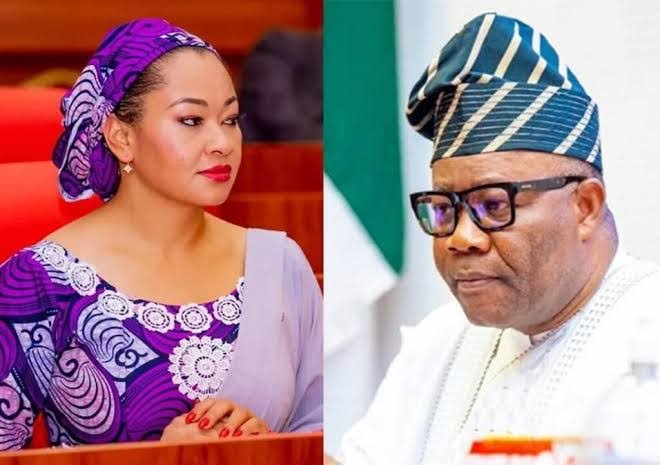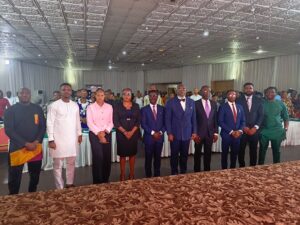In early 2025, a significant controversy unfolded in Nigeria’s Senate involving Senator Natasha Akpoti-Uduaghan, representing Kogi Central, and Senate President Godswill Akpabio. The issue began when Akpoti-Uduaghan publicly accused Akpabio of sexual harassment, alleging that he made inappropriate advances toward her and tied her legislative motions to demands for sexual favors. She first detailed these claims in an interview with Arise TV on February 28, 2025, asserting that Akpabio had harassed her during a visit to his residence in Akwa Ibom State on December 8, 2023, and later suggested she “take care of him” to ensure her motions were considered in the Senate. These accusations thrust the Nigerian Senate into a national spotlight, sparking widespread debate about gender, power dynamics, and accountability in the country’s political sphere.
Following her public statements, Akpoti-Uduaghan formally submitted a petition to the Senate, accusing Akpabio of sexual harassment, abuse of power, and obstruction of her legislative duties. However, the Senate’s response was swift and contentious. On March 6, 2025, the Senate Committee on Ethics, Privileges, and Public Petitions, chaired by Senator Neda Imasuen, rejected her petition on procedural grounds, citing violations of Senate rules—specifically, that she had personally signed the petition rather than having it endorsed by another senator, contravening established protocol. The committee then recommended her suspension, arguing that her actions, including the allegations, had brought disrepute to the Senate. After a plenary session debate, the Senate voted to suspend Akpoti-Uduaghan for six months, effective immediately, barring her from her office, withdrawing her allowances and security details, and requiring a written apology for her reinstatement before the suspension’s end.
The Senate’s official stance, articulated by Senate Majority Leader Opeyemi Bamidele on March 8, 2025, was that the suspension was not directly tied to the sexual harassment allegations but rather to Akpoti-Uduaghan’s alleged violations of Senate Standing Orders 2023. These included her refusal to move to a newly assigned seat during a plenary session on February 25, 2025—following a reshuffle prompted by party defections—and speaking without recognition from the presiding officer, deemed acts of defiance and unparliamentary conduct. The Senate emphasized that her petition was “dead on arrival” due to procedural flaws and denied that the suspension was retaliation for her accusations against Akpabio.
Public reaction was polarized and intense. Supporters of Akpoti-Uduaghan, including prominent figures like former Education Minister Oby Ezekwesili and human rights lawyer Kingdom Okere, condemned the suspension as an attempt to silence her and demanded an independent investigation into her claims. Protests erupted in Abuja, with groups both supporting Akpabio and rallying behind Akpoti-Uduaghan, the latter chanting “Akpabio must go.” Women’s rights advocates highlighted the timing—coinciding with International Women’s Day on March 8, 2025—as a stark irony, arguing that the case exposed systemic gender discrimination in Nigeria’s male-dominated Senate, where only four of 109 senators are women. Critics, however, including some senators and Akpabio’s wife, Uloma, who filed a N250 billion defamation lawsuit against Akpoti-Uduaghan, dismissed the allegations as baseless and politically motivated, pointing to a prior accusation against Akpabio by Joy Nunieh, a former official, as a pattern of unproven claims.
Akpabio, for his part, denied the allegations during a plenary session, asserting that he had never harassed any woman, citing his upbringing by a single mother and his role as a father to four daughters. He maintained that the matter was under judicial review—referencing a separate cyberbullying lawsuit filed by Akpoti-Uduaghan against his aide—while urging the public to await court decisions. Meanwhile, Akpoti-Uduaghan, undeterred, vowed to continue serving her constituents despite the suspension, filing a N100 billion ($64,000) lawsuit against Akpabio and calling her suspension “unjust” and a violation of natural justice.
The controversy has raised broader questions about due process and fairness in Nigeria’s Senate. Legal experts and observers, including former Senate President Bukola Saraki, argued that Akpabio should have recused himself from presiding over the session that suspended Akpoti-Uduaghan, given the conflict of interest. The lack of a transparent investigation into the harassment claims, coupled with the procedural dismissal of her petition, has fueled perceptions of impunity and eroded public trust in the Senate. As of March 9, 2025, the issue remains unresolved, with ongoing legal battles and public discourse underscoring deep-seated tensions over gender equity, institutional integrity, and the rule of law in Nigeria’s political landscape.




